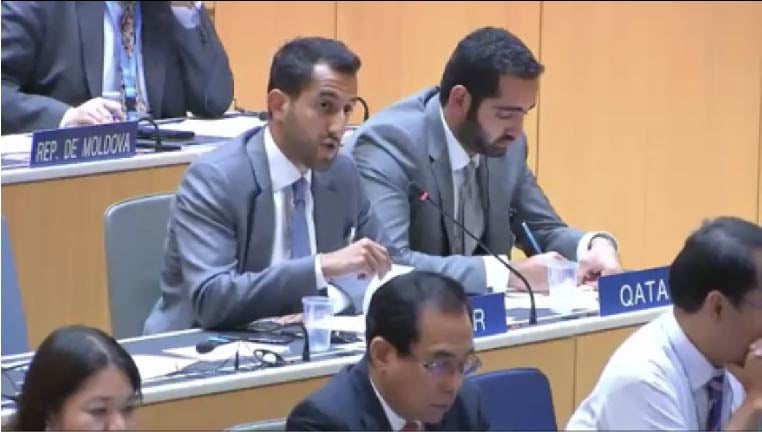QF Partner Georgetown University Alumnus Leads Qatar’s World Trade Organization Claim Win Against Piracy

In a message to Georgetown University in Qatar (GU-Q) students, Saleh Abdullah Al Mana, the Director of the Office of the State of Qatar to the World Trade Organization (WTO) and a 2013 GU-Q graduate, encouraged young people impacted by the pandemic to embrace uncertainty and remain optimistic in the face of adversity. As the head of Qatar’s WTO office in Geneva, Saleh led the team that successfully pursued an international trade dispute in Qatar’s beIN Media Group’s intellectual property rights claim against Saudi Arabia. The landmark case resulted in a recent WTO ruling that has been hailed globally as a victory for the State of Qatar.
The International Politics graduate of GU-Q, one of Qatar Foundation’s partner institutions, explained that the guiding wisdom he received from professors while a student remains meaningful to him today. “I will never forget hearing the phrase ‘uncertainty is always certain’. That’s why my advice to my fellow GU-Q graduates and current and incoming students is to think about a career path and future that inspires you, and inspires your commitment despite the challenges.”
The State of Qatar filed the official request to establish a Panel to adjudicate the dispute through the WTO’s Dispute Settlement Body (DSB) in December of 2018, only two months after Saleh was appointed in his new role as head of Qatar’s WTO office in Geneva. Saleh was part of the team that presented evidence of commercial-scale piracy of Qatar’s intellectual property. The proceedings took place throughout tense oral hearings and written submissions by both parties. Third party member states, who were concerned about the wide scale unchecked piracy perpetuated by the broadcast pirate “beoutQ,” also participated in this landmark case.
The WTO Panel last week determined that Saudi Arabia had breached global rules on intellectual property rights by failing to prosecute the pirate broadcaster and is now requested to conform with its obligations as a signatory of WTO’s Agreement on Trade-Related Aspects of Intellectual Property Rights.
The ruling will be legally binding once it is formally adopted, which is significant in two ways, according to Saleh. “This is one of the first rulings by an international dispute settlement mechanism that has found one of the blockading countries in clear violation of international rules when it comes to the illegal measures imposed on the State of Qatar since 5th June 2017,” he said.
“And secondly, this landmark ruling sends a message to the world that members states cannot violate international trade agreements by masking them to be unfounded and baseless national security concerns, as the blockading countries are attempting to do.” The DSB is responsible for overseeing the entire dispute settlement process and has the authority to enforce measures to resolve violations committed by member states. Noting that the stakes go beyond Qatar’s trade rights, Saleh said: “The WTO made it clear that every country is bound by the same rules. This was a win for the international rule of law.”